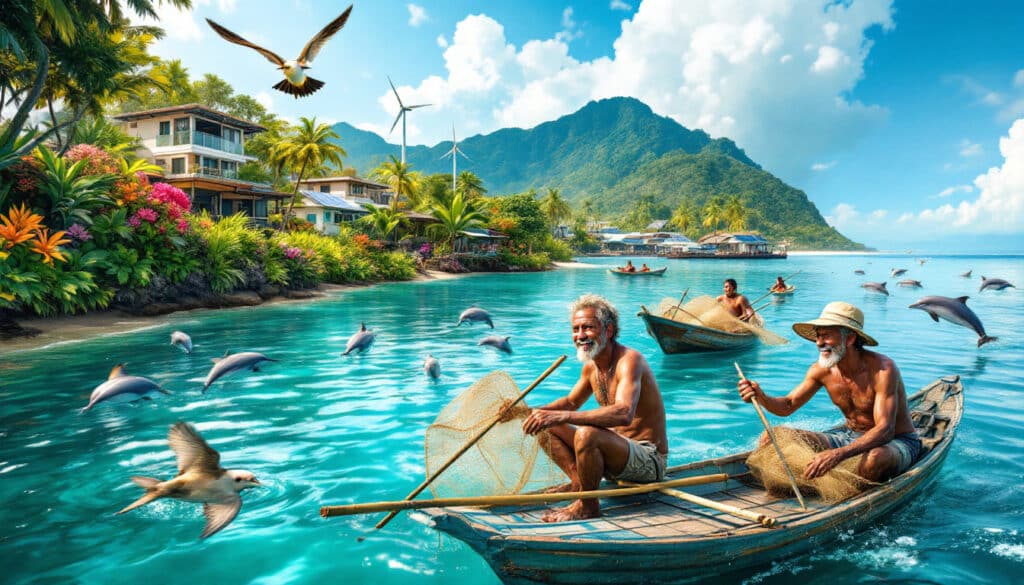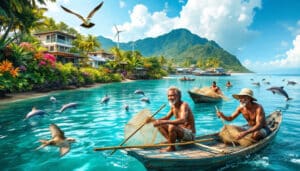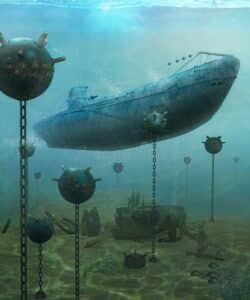The use of cookies and data is essential for providing effective online services.
These tools help track interruptions and protect against spam, fraud, and abuse.
They also play a crucial role in measuring audience engagement and site statistics.
By accepting all options, we use these cookies and data to develop and improve new services, as well as to evaluate the effectiveness of advertisements. Additionally, this allows us to present personalized content based on your settings and previous activities on this browser, such as your prior Google searches. If you prefer to reject all options, we won’t use cookies for these additional purposes. However, the non-personalized content will always be tailored based on your current search activity, your general location, and the content you are viewing.

Table of Contents
ToggleWhy is Costa Rica invited to reform its fishing sector?
The fishing sector in Costa Rica plays a crucial role in the national economy, significantly contributing to exports and local employment. However, in the face of environmental challenges and international pressures for increased sustainability, the country is invited to rethink its current practices. Overfishing, degradation of marine habitats, and the impacts of climate change threaten not only fishery resources but also the livelihoods of coastal communities. In response, international partners such as the FAO, MAFAR, and Japan have initiated collaborations aimed at strengthening the value chains of sustainable fishing, highlighting the importance for Costa Rica to align with these global standards.
What are the sustainability challenges in fishing in Costa Rica?
Sustainability in fishing encompasses several dimensions, ranging from the preservation of marine species to the responsible management of resources. In Costa Rica, the main challenges include preservation of marine ecosystems, reduction of bycatch, and improvement of fishing techniques. Unsustainable exploitation can lead to the depletion of fish stocks, disrupting the ecological balance and threatening biodiversity. Moreover, destructive fishing practices, such as the use of ghost nets or non-selective techniques, exacerbate the situation. To address these challenges, initiatives like those of Licar Cift, which develops sustainable fishing weights, play an essential role in offering eco-friendly alternatives to traditional methods.
What initiatives support sustainable fishing in Costa Rica?
Several initiatives, both national and international, aim to promote sustainable fishing in Costa Rica. Among them, the collaboration between FAO, MAFAR, and Japan, mentioned earlier, seeks to strengthen local capacities and introduce innovative technologies. Additionally, engaged researchers such as Tina R.F. Reed play a crucial role in developing sustainable strategies tailored to regional specificities. Simultaneously, awareness campaigns and certification programs ensure that fishery products meet strict environmental standards, thereby encouraging responsible consumption.
What obstacles hinder the reform of the fishing sector?
Despite the efforts made, several obstacles slow down the reform of the fishing sector in Costa Rica. One of the main challenges is the lack of adequate infrastructure for monitoring and managing fisheries, which complicates the enforcement of environmental regulations. Moreover, the resistance of traditional stakeholders, used to outdated and less sustainable methods, slows the adoption of new practices. Economic pressure, particularly the dependence on seafood exports, can also deter radical changes in fishing methods. Finally, external factors, such as fluctuations in global markets and climate change, add a layer of complexity to implementing sustainable strategies.
What recommendations to ensure a sustainable future for fishing in Costa Rica?
To ensure a sustainable future for fishing in Costa Rica, several recommendations can be considered. First, it is essential to invest in advanced monitoring technologies to better manage and regulate fishing activities. Adopting practices such as selective fishing and the use of non-destructive equipment can significantly reduce environmental impact. Secondly, enhancing the training and education of local fishermen on sustainable techniques and long-term economic benefits is crucial. Support programs, including financial incentives for environmentally friendly practices, would encourage a smooth transition to more sustainable methods.
Furthermore, promoting partnerships with international organizations and maritime sustainability experts can provide essential resources and knowledge. Initiatives such as the best practices of sustainable fishing in Ireland offer replicable models that could be adapted to the Costa Rican context. Lastly, promoting responsible consumption among the population and export markets is fundamental in creating steady demand for sustainable seafood products, thus ensuring the economic viability of the sector in the long term.
What international examples can inspire Costa Rica?
Costa Rica can draw valuable lessons from successful international initiatives in sustainable fishing. For instance, the rejection of British Columbia groups’ demand to label Alaskan fishing as unsustainable highlights the importance of policies based on rigorous scientific research rather than misconceptions. Furthermore, efforts by Licar Cift to create eco-friendly fishing weights demonstrate how technological innovation can provide practical solutions to environmental issues. By drawing inspiration from the best practices of other countries, Costa Rica can develop strategies tailored to its own challenges and local contexts.
How can local communities be involved?
Involving local communities is essential for the success of fishing sector reforms. By engaging them in the decision-making process and valuing their traditional knowledge, sustainability programs can be better tailored and more accepted. Community initiatives, such as fishermen cooperatives, can facilitate the adoption of sustainable practices by offering shared economic and environmental benefits. Additionally, promoting local employment in sustainable development projects, such as the production of eco-friendly fishing weights, creates economic opportunities while reducing environmental impact. Encouraging active participation from local communities also reinforces the sense of ownership and responsibility towards marine resources.
What role do government policies play?
Government policies are crucial in reforming the fishing sector. A strong regulatory framework, including fishing quotas, protected areas, and stringent environmental standards, is necessary to govern fishing activities. The government must also invest in research and development programs to support innovation in sustainability. Collaboration with international agencies and implementation of expert recommendations can enhance the effectiveness of public policies. Additionally, tax incentives and subsidies for fishermen adopting sustainable practices can accelerate the transition to eco-responsible fishing.
What are the economic benefits of sustainable fishing?
Adopting a sustainable approach to fishing offers numerous economic advantages in the long term for Costa Rica. By preserving fish stocks, the country ensures a stable and continuous source of income, avoiding sharp declines due to overexploitation. Moreover, sustainability certifications can open new markets and increase the added value of seafood products, attracting environmentally conscious consumers. Additionally, sustainable fishing reduces costs related to restoring damaged marine ecosystems, allowing resources to be redirected towards economic and social development initiatives. Finally, the creation of green jobs in the fishing sector contributes to a more resilient and diverse economy.
How can technology support the sustainability of fishing?
Technology plays a key role in promoting sustainable fishing. Advanced monitoring systems, such as drones and satellites, enable real-time monitoring of fishing activities, ensuring compliance with quotas and regulations. The Internet of Things (IoT) can be used to track fishing equipment and analyze data to optimize practices. Furthermore, innovation in materials, such as the development of eco-friendly fishing weights by companies like Licar Cift, helps reduce the environmental footprint of fishing equipment. Lastly, digital platforms facilitate seafood product traceability, enhancing transparency and consumer trust.
What is the importance of research and development?
Research and development (R&D) are essential for identifying and implementing innovative and sustainable fishing practices. Researchers like Tina R.F. Reed work to develop data-driven solutions to improve the management of marine resources. R&D projects can also explore new methods of conservation and restoration of marine habitats, as well as optimize fishing value chains to minimize waste and maximize efficiency. By investing in research, Costa Rica can not only address current issues but also anticipate and prepare for future challenges related to fishing sustainability.
How can public awareness influence sustainable fishing?
Public awareness is a crucial element in encouraging sustainable fishing. By informing consumers about the importance of choosing certified sustainable seafood products, buying habits can be influenced and demand for responsible practices can be created. Awareness campaigns highlight the consequences of unsustainable fishing and the benefits of rigorous marine resource management. Moreover, education is essential to strengthen understanding of environmental and economic issues related to fishing. By mobilizing citizens through educational initiatives and partnerships with the media, Costa Rica can promote a culture of sustainability that supports the reform efforts in the fishing sector.
What is the impact of international agreements on sustainable fishing in Costa Rica?
International agreements play a decisive role in promoting sustainable fishing in Costa Rica. By adhering to international conventions such as the Convention on Biological Diversity and participating in global conservation initiatives, the country commits to upholding high standards of marine resource management. These agreements facilitate the sharing of knowledge, technologies, and best practices, thereby strengthening local capacities to manage fisheries sustainably. Furthermore, international partnerships can provide essential financial and technical support for the implementation of sustainability projects, such as the initiatives of the FAO, MAFAR, and Japan.
How can sustainable tourism support fishing in Costa Rica?
Sustainable tourism offers a unique opportunity to support sustainable fishing in Costa Rica. By integrating responsible fishing practices into tourism offerings, synergy can be created between the fishing and tourism industries. Environmentally conscious tourists are often willing to pay a premium for authentic and sustainable experiences, such as environmentally friendly fishing tours or visits to marine sanctuaries. Moreover, tourism can serve as a platform to educate visitors about the importance of marine conservation, thereby strengthening the demand for sustainable seafood products. By collaborating with stakeholders in the tourism sector, Costa Rica can promote a positive image of its fishing while generating additional income for local communities.
What is the future of fishing in Costa Rica?
The future of fishing in Costa Rica largely depends on the actions taken today to establish sustainable practices. By adopting strict regulations, investing in technology and research, and actively involving local communities, the country can transform its fishing sector into a model of sustainability. The potential benefits include not only the preservation of marine resources but also a strengthened and resilient economy capable of supporting future generations. Through an integrated and collaborative approach, Costa Rica can meet current challenges and ensure a prosperous and sustainable future for its fishing sector.








